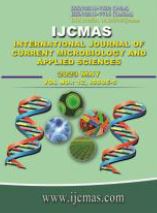


 National Academy of Agricultural Sciences (NAAS)
National Academy of Agricultural Sciences (NAAS)

|
PRINT ISSN : 2319-7692
Online ISSN : 2319-7706 Issues : 12 per year Publisher : Excellent Publishers Email : editorijcmas@gmail.com / submit@ijcmas.com Editor-in-chief: Dr.M.Prakash Index Copernicus ICV 2018: 95.39 NAAS RATING 2020: 5.38 |
Newborn feeding among tribes in India is influenced by traditional beliefs and practices. Each tribal community has its own unique feeding practices which have considerable impact on the health and survival of infants. Information about these practices is vital in planning effective child health services. A review of published articles in Google Scholar and Pub-med data bases for the period 2018 to 2022 was carried out to retrieve information on newborn feeding practices in tribal areas in various parts of India. Time of initiation of breastfeeding, feeding of colostrums and prelacteal feeding were considered for analysis. Thirteen full text studies were reviewed. Delay in initiation of breast feeding up to 3-4 days was observed and the common beliefs for delayed initiation of breastfeeding were that it was harmful or not ready to be fed for 3 days. The reasons for discarding colostrums were that it was impure, causes indigestion or diarrhea. It was observed that the newborns had been fed with prelacteal feeds such as plain water, sugar or salt solution, honey, diluted cow’s milk and milk mixed with jaggery. The beliefs were that these feeds help to resist hunger, clean the tongue and stimulate suckling. These harmful practices were observed to be prevalent among most of the tribes in different geographic locations of India. The study clearly implies that there is a need to explore further and conduct area specific tribal cultural feeding beliefs and practices. This helps in taking up early intervention programmes enhance successful breastfeeding practices and weaning practices and strengthen the knowledge of healthcare providers to promote proper newborn care to reduce infant mortality and morbidity in tribal areas to achieve SDG goals.
 |
 |
 |
 |
 |